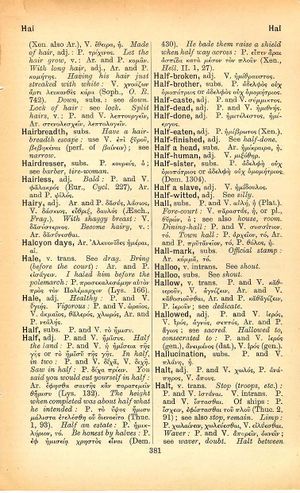halt: Difference between revisions
From LSJ
(de4_1) |
m (Woodhouse1 replacement) |
||
| Line 1: | Line 1: | ||
{{Woodhouse1 | {{Woodhouse1 | ||
|Text=[[File:woodhouse_381.jpg|thumb|link={{filepath:woodhouse_381.jpg}}]] | |Text=[[File:woodhouse_381.jpg|thumb|link={{filepath:woodhouse_381.jpg}}]] | ||
P. and V. [[χωλός]], P. [[ἀνάπηρος]], V. [[ἄπους]]. | ===adjective=== | ||
[[prose|P.]] and [[verse|V.]] [[χωλός]], [[prose|P.]] [[ἀνάπηρος]], [[verse|V.]] [[ἄπους]]. | |||
===verb transitive=== | |||
[[stop]] ([[troop]]s, etc.): [[prose|P.]] and [[verse|V.]] [[ἱστάναι]]. | |||
===verb intransitive=== | |||
P. [[ἐπίστασις]], ἡ (Xen.), [[ἐπίσχεσις]], ἡ; see [[delay]]. | [[prose|P.]] and [[verse|V.]] [[ἵστασθαι]]. | ||
of [[ship]]s: [[prose|P.]] [[ἴσχειν]], [[ἐφίστασθαι τοῦ πλοῦ]] ([[Thucydides|Thuc.]] 2, 91); see also [[stop]], [[remain]]. | |||
[[limp]]: [[prose|P.]] [[χωλαίνειν]], [[χωλεύεσθαι]], [[verse|V.]] [[εἰλύεσθαι]]. | |||
[[waver]]: [[prose|P.]] and [[verse|V.]] [[ἀπορεῖν]], [[ὀκνεῖν]]; see [[waver]], [[doubt]]. | |||
[[halt between two opinions]]: [[prose|P.]] [[ἐπαμφοτερίζειν]]. | |||
[[know you what part of your tale halts the most]]? [[verse|V.]] [[οἶσθ' οὖν ὃ κάμνει τοῦ λόγου μάλιστά σοι]]; ([[Euripides|Eur.]], ''Ion'', 363). | |||
===substantive=== | |||
[[prose|P.]] [[ἐπίστασις]], ἡ ([[Xenophon|Xen.]]), [[ἐπίσχεσις]], ἡ; see [[delay]]. | |||
}} | }} | ||
{{GermanLatin | {{GermanLatin | ||
|dela=[[halt]]! [[durch]] die Imperative der Verba [[unter]] »[[halten]] no. II, 2«. | |dela=[[halt]]! [[durch]] die Imperative der Verba [[unter]] »[[halten]] no. II, 2«. | ||
}} | }} | ||
Revision as of 08:51, 20 May 2020
English > Greek (Woodhouse)
adjective
P. and V. χωλός, P. ἀνάπηρος, V. ἄπους.
verb transitive
stop (troops, etc.): P. and V. ἱστάναι.
verb intransitive
of ships: P. ἴσχειν, ἐφίστασθαι τοῦ πλοῦ (Thuc. 2, 91); see also stop, remain.
limp: P. χωλαίνειν, χωλεύεσθαι, V. εἰλύεσθαι.
waver: P. and V. ἀπορεῖν, ὀκνεῖν; see waver, doubt.
halt between two opinions: P. ἐπαμφοτερίζειν.
know you what part of your tale halts the most? V. οἶσθ' οὖν ὃ κάμνει τοῦ λόγου μάλιστά σοι; (Eur., Ion, 363).
substantive
P. ἐπίστασις, ἡ (Xen.), ἐπίσχεσις, ἡ; see delay.
German > Latin
halt! durch die Imperative der Verba unter »halten no. II, 2«.

